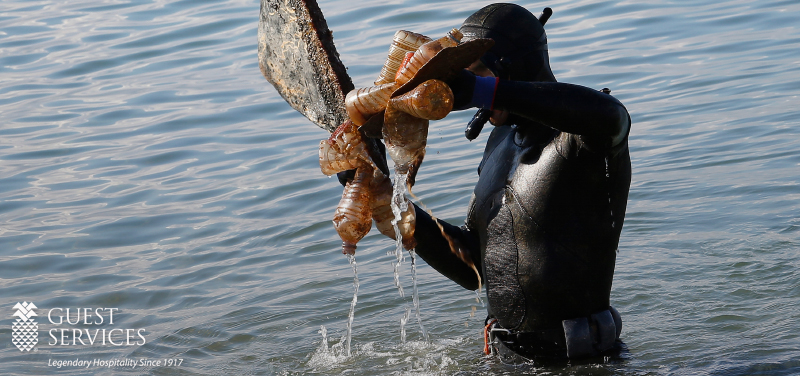There is a phrase that says, “It is the greatest of mistakes to do nothing because you can only do little; do what you can.” However, The Lake Mead National Recreation Area teams aren’t just doing something little to help the environment; they have conducted a yearly Ecology Dive into the lake since 2003.
“Volunteers dive underneath the docks and into the open water to pick up any trash or other items that may have fallen overboard off houseboats,” says Rod Taylor, Vice President of LMNRA Guest Services. “Our main goal is to improve the environment in, under, and around the docks.”
Each year, the Ecology Dive occurs on the second Saturday of October, due to perfect weather conditions above the water and the temperature of the water near the 90° mark. For the first Ecology Dive in 2003, the event had around 200 volunteer divers to help clean the lake.
“When we had such a big group like that, we dispersed so many boats to the various beaches in the area. People were even taking their boats out to help the initiative; it almost was too hectic to handle,” comments Rod.
Sixteen years ago, the Ecology Dive would pick up enough trash to fill a 40-yard dumpster. However, with the increase in the educational programs at Cottonwood Cove and throughout the Lake Mead National Recreation Area, the most recent dive simply needed 75 volunteer divers to accrue only a four-yard dumpster.
“The Ecology Dive has become an eco-tourism event. We have had volunteers fly in from as far as New York to partake in the action,” says Dive Master Ron Dalke. “Events like this are a great opportunity for networking while doing an activity we love that helps the environment.”
Volunteers have the option to dive in two one-hour long segments and each is given a number to keep track of all divers entering and exiting the water. Wristbands are given to each diver with their individual number on them to help everyone keep track. Participants are released in one section at a time for maximum safety for the divers. Each diver has to call out their number before going underneath the water as well as during the “roll call” after the dive to ensure everyone returned to the surface.
“Safety for our divers is our number one concern. The new divers in the event are kept in open water sections so those with more experience can maneuver under the docks. The buddy system is also utilized to ensure everyone is accounted for.” says Rod. “We also have numerous people on the dock looking for bubbles and helping pull the full trash bags from the divers to the shore.”
There is no age restriction for Ecology Dive volunteers; only the divers must have their open water scuba certification before going under water. Those without equipment can obtain loaner equipment from local dive shops. The Lake Mead National Recreation Area community becomes a major part of this annual event.
Rod says, “As a thank you, we go around the community to get prizes to raffle off to the participants at the barbeque after the dive. This is a great time to talk about diving as well as compare stories on what we found while cleaning up the trash.”
During the Ecology Dives, common household items blown overboard off the houseboats are typically found; most often that consists of towels, plastic bags, and soda cans. Sometimes, participants find unique “treasures” during their hunt.
“I went diving yesterday, and I actually found an old stove,” says Ron. “In my diving experiences, I have found nine fishing poles, three GoPros, five smartphones, diamond watches, batteries, engine blocks, chairs, and even cash. One time I found a gas station sign with gas costing only $1.28! Some of the stuff we find is from a time when people didn’t think about how dumping items like that affects the environment.”
Even after the Ecology Dive is over, the Lake Mead National Recreational Area has programs and events throughout the year to showcase the importance of continual lake care. Sayings like “boat it out, bag it in” and “stash your trash” help people remember what actions to take while out on the water.
“The most important thing we are trying to teach is for people not to be lazy with their trash disposal. There are dumpsters throughout the area for people to put trash in; just bagging the trash and leaving it on the beach won’t help the overall cause,” says Herb Riggle, Cottonwood Cove Manager.
In addition to the educational programs, there is the “We love our Lake” campaign and Dessert Walk. “We love our Lake” allows local Boy Scouts and other visitors that want to volunteer go out on a houseboat and, as long as they come back with full trash bags from their adventures, all they have to do is pay for the fuel they used. The boys earn badges while on the houseboat.
The Dessert Walk is a spring cleaning for the beaches. Volunteers are taken by boat to pick up trash at the various beaches, campgrounds, and other surrounding properties in the Lake Mead National Recreation Area. This is a collaborative effort with the National Park Service as they bring their trailers and pick-up sticks.
Ron says, “our Ecology Dives and other programs are meant to be educational and fun for the community to get together and make the Lake Mead National Recreation Area beautiful. Plus, it is always interesting to guess what you might find in the water!”
This year’s Ecology Dive is on October 12, 2019. Once that date gets closer, there will be more information about how to sign up as a volunteer diver on their social media pages. If you have any other questions about the dive, please contact Ron at 702-293-1153.
Thank you to all team members at the Lake Mead National Recreation Area for putting on such a great event that showcases outstanding sustainability efforts!


Leave a Comment